Business
SGF requests Nigerians’ assistance with economic recovery

Dr. George Akume, Secretary to the Government of the Federation (SGF), has pleaded for everyone’s cooperation and understanding in order to revive the flagging national economy.
The call was made by Akume on Monday in Lagos at the Nigerian Institute of Management Chartered (NIM) 2023 Annual National Management Conference in his capacity as Senior Special Adviser to the SGF.
The theme of the event, according to the News Agency of Nigeria (NAN), was “Managing Nigeria’s Path to Sustainable Economic Growth and Prosperity: The Challenges before the New National Leadership.”
According to the SGF, the topic was appropriate and pertinent for setting the country on a new course and ushering in a national renaissance in keeping with the federal government’s eight-point strategy.
He recalled President Bola Tinubu’s eight-point plan for reviving the economy and improving living conditions for all Nigerians.
These include ensuring access to food, eradicating poverty, fostering economic development and job creation, enhancing security, levelling the playing field for all players—especially businesses—and battling corruption.
Akume claimed that the Federal Government was making concerted efforts in all vital sectors to revive the economy and bring about the democratic dividends.
“By choosing this year’s conference’s theme, the Institute has further shown its dedication to helping the federal government realise its goal of repositioning and turning around the country’s economy.
“I can confidently state to this group of experienced managers that the Bola Tinubu-led government is eager to build a name for itself and will not fall short in this difficult but doable assignment.
As we beg for additional time to carry out our eight-point plan, we also ask for everyone’s help and understanding to lift the economy out of its gloom, he said.
Akume asked the NIM to increase its appearance at open National Assembly sessions in order to provide more substantial professional management feedback that would be most pertinent to the general public.
“Good leadership based on durable democratic ideals must be at the forefront of our collective consciousness at all times if Nigeria is to truly embark on a path of greatness and prosperity.
“I therefore urge the Institute to work with the National Orientation Agency (NOA) and other pertinent organisations to assist this cause in order to make sure that the code of conduct is ingrained in the culture of all Nigerians.
“Nigeria shall become an enviable nation,” he stated, if all Nigerians align themselves with the Institute’s code of conduct.
Dr. Christiana Atako, President of NIM, mentioned in her remarks that President Bola Tinubu assumed power in May of this year with a weak and split economy.
Atako applauded the current administration’s efforts to confront the many issues head-on and come up with viable solutions to resurrect and overhaul the country’s economy.
She pointed out that the eight-point programme his administration unveiled indicated that it had started to work.
Atako pointed out that the government’s initiatives to float the Naira and provide gasoline subsidies, both of which came with certain hardships, necessitated measures to lessen their impact on society’s most vulnerable individuals.
The Institute cautions the Federal Government to maintain regular contact with labour and civil society organisations, local authorities, and other stakeholders.
“This is to ensure that effective corrective programmes are implemented to assist the populace in coping with the new economic reality.
“Overall, the administration should put its efforts into enacting laws that would encourage economic expansion, job creation, and the eradication of poverty.
This might entail steps to encourage entrepreneurship and international investment, as well as the diversification of the economy, the restarting of the nation’s refineries, and investments in infrastructure, education, and healthcare.
“The Institute calls on Nigerians to support the Federal Government’s sound economic policies in order to work together.
“Budgeting, increasing productivity, reducing consumption, embracing local goods, and looking for alternative transport can help Nigerians overcome the effects of subsidy removal on their daily lives,” she said.
Atako argued that it was only reasonable and logical for people in government to make deliberate efforts to lower the cost of governing, given that the general populace was already tightening their belts as a result of ongoing economic measures.
She opined that unnecessary and wasteful spending must be avoided at all costs in order to demonstrate equal sacrifice and dedication to revive the economy on both sides and to foster a sense of shared purpose between the rulers and the governed.
The citizenry, not their representatives, must be the main focus and the recipients of the benefits of our democratic system, she added. “We need to review and reinvent our version of democracy, find ways to adjust it, and ensure a system and a structure that guarantee this.”
The publication of Management Professionals, a study publication on management practise in Nigeria, was also presented, according to NAN.
